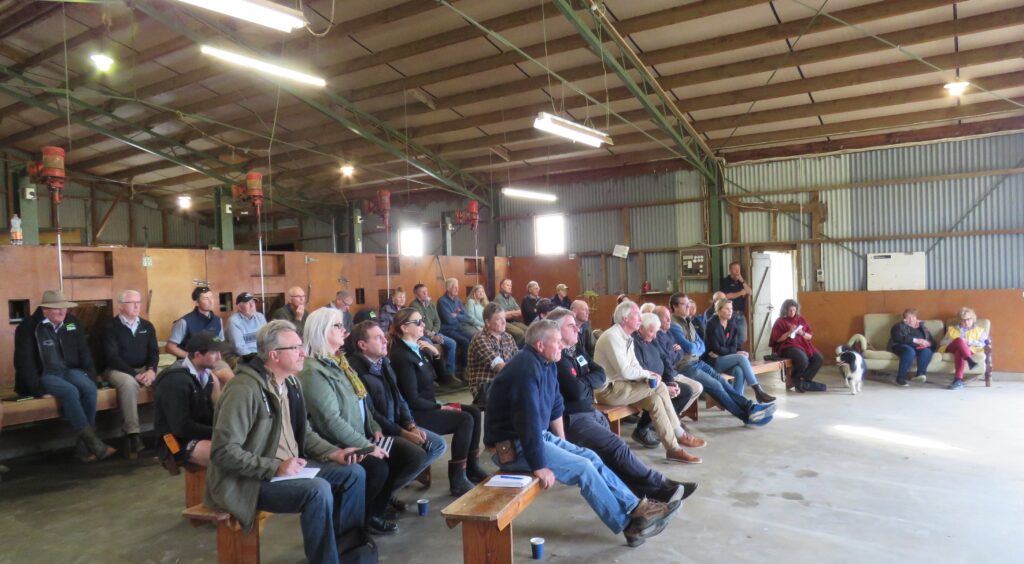Addressing unworkable and overly prescriptive regulation was the basis of discussion for Associate Minister of Agriculture Mark Patterson at the government woolshed meeting on Mt Somers Station.
There were strong takeaway messages from the floor of about 50 farmers and rural community representatives.
Patterson acknowledged the tough times in farming and the challenges the farming sector faces with high domestic inflation rates, high interest rates, increasing farm input costs, low returns and adverse events.
“Our priority is to relieve the pressure for farmers coming from unworkable central government policies, that’s why we are reaching out to the rural communities and getting out in front of farmers,” Patterson said.
“We talked a big game as collective parties in parliament, we promised to cut the compliance, take cost out and add flexibility back in.
“I want to hear your issues from you, farmers, and take that feedback back to Wellington.”
The meeting was driven by questions and answers.
As the minister responsible for wool, Patterson blew the first whistle for the fibre.
“Sheep farmers have long been the backbone of NZ’s farming communities and we need to get in behind and support them. In doing that we will be engaging with people from Northland to Southland to discuss grassroots solutions.”
From the floor the question was quick to come – “How are you going to address the profitability of wool, we have been battling for 25 years? There is no incentive to keep sheep on land that is suitable only for sheep, right now there is no profit, we are getting a bill for our wool.”
Patterson said he is “keenly aware”.
“I’ve sat too for many years; the massive degree of cynicism is well founded.
“We are on a burning platform here; in six months we have to turn this around to keep sheep versus forestry and shedding sheep. It’s a big challenge but we are up for it,” he said.
The focus quickly moved to the government’s announcement regarding urgent changes to the resource management system.
While proposed changes to the Resource Management Act were a relief for many, farmers expressed ongoing uncertainty about the possibility of regulations as a barrier to making on-farm investments and changes to farming systems safe in the knowledge that regulations will be science-based, practical and enduring for both farming and the environment.

“You say you are giving direction back to regional councils, but how?” South Canterbury farmer Nicky Hyslop asked.
Patterson replied: “That’s the challenge at the moment as we’re still operating under the old rules and there’s mixed reaction from councils, with some wanting to push on while others are prepared to wait and see what the new rules bring.”
The message from the shed of mostly Canterbury farmers was that Environment Canterbury is unfriendly to farmers, being strongly legislative and setting up a lot of hoops to jump through.
“Unless regional councils are given clear direction from government, the way consent conditions are looking at the moment, there’s a whole community going to disappear,” Kerry Harmer of Castle Ridge station said.
“You talk about crossbred wool disappearing, well Merino wool will disappear too.
“ECan is pushing beyond national rules, we need input from government to pull back on ECan rules.”
Patterson assured farmers that the government is working on getting new legislation through “as quick as possible and in a move away from one-size-fits-all”.
Federated Farmers vice-chair Colin Hurst said the changes to unworkable and expensive regulations, while set to mark the end of the war on farming, still come with an air of caution.
He said current rules are impractical, completely disconnected from the reality of farming, devoid of all common sense, and heap a ton of unnecessary costs on farmers.
“The constant chopping and changing has been incredibly confusing and has completely undermined farmers’ confidence to invest in their businesses.”
Hurst was critical of flawed stock exclusion rules.
“Fencing streams on extensive properties with low stocking rates has the potential to cost farmers hundreds of thousands of dollars, for little environmental gain.
“We need to be empowering farmers and supporting them to make further improvements on their properties instead of tying them up in needless red tape.”
Farm plans allow farmers and rural communities to tailor their environmental improvement actions to match their specific local needs.
“This will always lead to much better outcomes, and more community buy-in, than impractical and expensive one-size-fits-all rules driven out of Wellington.”
Patterson said everyone needs to work together.
“We need to do this collaboratively, but there is a legislative process to follow, and I urge you, farmers, to submit. We don’t want to rush the process and get it wrong.”
Freshwater storage and management, wilding pines and banking were also hot topics up for discussion.
The government “needs to tell every farmer in NZ where we are going and how we are going so we can all stay in business” was the takeaway message to Patterson as one farmer summed up the meeting.










